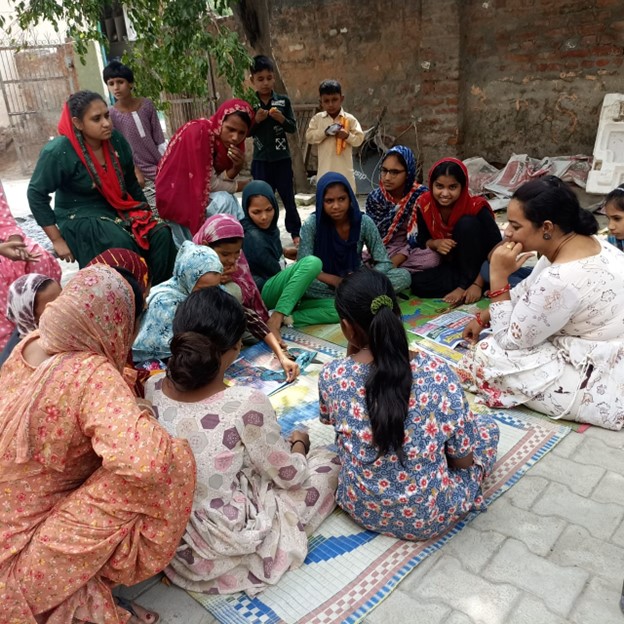Village chaupals in Haryana have historically been male-dominated spaces, deeply rooted in tradition and characterised by gender inequality. These communal gathering places, once hubs of social interaction, entertainment, and decision-making of Panchayats, were strictly off-limits to women. Only men were permitted to participate. If a matter involving a woman arose, male family members would relay the information to her at home. When a woman needed to appear before the Panchayat, she would be made to stand in front of the chaupal with her face covered, as it was considered disrespectful for women to sit in front of men. Women were not allowed to speak in front of the Panchayat, only to nod or shake their heads in agreement or disagreement. Women were even expected to veil themselves when passing by the chaupal, reinforcing the notion that it was improper for them to sit or converse openly in male-dominated spaces. These deeply entrenched beliefs and customs granted men a dominant position, effectively excluding women from important public spaces and perpetuating the idea that women should be confined to the household.
 The Martha Farrell Foundation’s (MFF) work with women and adolescents from various communities has highlighted that these chaupals have not only been exclusionary, but also unsafe spaces for women and girls. Since 2013, MFF and its partner organisations have worked with women and adolescents to conduct participatory safety audits in over 70 villages in Haryana, mapping the spaces where women and girls feel safe or unsafe within their communities. These mapping exercises revealed that chaupals are often sites where men gather to engage in activities such as gambling and drinking, making them intimidating for women and girls. Many women and girls reported that, even during the day, they felt vulnerable to harassment by the men when passing by the chaupal.
The Martha Farrell Foundation’s (MFF) work with women and adolescents from various communities has highlighted that these chaupals have not only been exclusionary, but also unsafe spaces for women and girls. Since 2013, MFF and its partner organisations have worked with women and adolescents to conduct participatory safety audits in over 70 villages in Haryana, mapping the spaces where women and girls feel safe or unsafe within their communities. These mapping exercises revealed that chaupals are often sites where men gather to engage in activities such as gambling and drinking, making them intimidating for women and girls. Many women and girls reported that, even during the day, they felt vulnerable to harassment by the men when passing by the chaupal.
In 2021, when the MFF team discussed opening a women’s centre in Bichpadi village, Panipat, with the village’s women domestic workers, the women suggested that the centre be located in their village chaupal. The Community Support Centre (Swabhiman Kendra) was envisioned as a safe space where women could come together, learn, collectivise, and support one another. The aim was for the centres to be run directly by the women domestic workers, allowing them to decide on the activities they wished to conduct and how they wanted the space to function, and to create a space where the women could develop their leadership skills and take charge of their own lives.
After much effort, the team spoke with the village Numberdar (headman) and decided to open the centre in the village chaupal. While the Numberdar and the women supported the idea, most men in the village opposed it. When the centre opened, many women came to the chaupal secretly, as their husbands or families forbade them from going there. Some men even took their wives away from the meetings. Despite these challenges, the women enjoyed coming to the centre, which quickly became a space where they could sit, talk, learn new things, and take time for themselves. The women began learning sewing at the centre as a way to visit the chaupal without arousing suspicion, as sewing was considered an acceptable activity for women by the wider community. Gradually, women and girls from across the village joined the centre, where they learned about issues such as gender-based discrimination, gender-based violence, women’s rights, legal protections, health and hygiene, menstrual health and wellbeing, and financial literacy. The knowledge gained from these sessions helped them understand societal issues and develop the confidence to speak up for their rights without fear. A change began to emerge within themselves, their families, and the village community, as they questioned traditional gender-based practices.
The impact of this change has been profound. The chaupal, once a place where women were unwelcome and felt unsafe, has now become a safe space where they can discuss their lives, desires, and rights. Men from Bichpadi village have also started accessing the centre to seek information about government schemes, official documentation, and financial matters such as banking. They, too, have come to recognise its value. The most significant shift occurred on Women’s Day 2022, when the community’s men and boys cleaned and decorated the chaupal, bringing chairs and tables from nearby homes, acknowledging its new role as a shared space.
This transformation has not been limited to Bichpadi; it has spread to other villages. A new centre has recently opened in Rakshera village, in the summer of 2024, also within the chaupal. This change is about more than reclaiming a physical space; it is about challenging deeply entrenched gender norms and empowering women to take active roles in their communities. As more women confidently say, "Let’s go to the chaupal," these once exclusive spaces will become symbols of empowerment and equality.